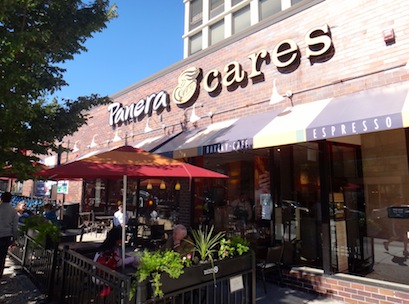“We exist to feed each and every person who walks through our doors with dignity regardless of their means.” Now that’s a statement of purpose that staff members can really get behind, in contrast to the marshmallow mission statements of many companies. In many ways, it’s an anarchic, anti-retail idea. (Serve people regardless of their means? Really? Surely we’re there to extract the punters’ money, and if they can’t pay, turn ‘em away!) Yet the notion is right on trend in
retail in the US right now, and it’s the way of the future – care more, take less, give back.
The retail concept with that bold mission is called Panera Cares, and I was first alerted to it in a thought provoking white paper published in the Journal of Brand Strategy.
It carried the headline, Retailing with Purpose, and was penned by Chicago’s Gwen Morrison, co-CEO of The Store (WPP’s global retail practice*), and Anneliza Humlen, president and founder of New York-based, SocialVoice.
Panera is a highly successful chain of nearly 1600 cafes across the US and Canada. Panera Cares is the same proposition, with a novel twist. It’s just like Panera’s regular cafes, except there is no price list – you pay what you can afford. And if you don’t have a thin dime to your name, you can earn your meal by helping out wiping tables or tidying up.
As reported in the white paper, Panera’s founder, Ron Shaich, envisaged the Cares concept as a way to practice “conscious capitalism – or what we like to call ‘enlightened self-interest’,” at the same time as elevating and dignifying the traditional soup kitchen.
In Chicago this week I saw Panera Cares first hand and experienced how well it works. I also visited Patagonia, another retailer (also referred to in the paper) which is challenging convention and embracing sustainability.
Patagonia, a retailer of high quality, ethically produced adventurewear, has just launched a new line, called Worn Wear. It is what it says – used clothing, restored and refurbished to be “Better than New”, according to a Patagonia ad which appeared in the press during New York Fashion Week.
Worn Wear is a clever concept, because it not only promotes durability rather than disposability, but celebrates the quality and character of Patagonia clothing.
I finished my Chicago walk at Whole Foods, the hugely successful organic-based grocer. Its co-founder and CEO, John Mackey, literally wrote the book on Conscious Capitalism (and it became a bestseller), telling the story of how the business supports local producers, gives a portion of its profits to charity, and subsidises health care for its workers.
There are many Australian retailers who operate with a conscience. But I don’t believe that we have yet to see the movement broadly emerge in this market. Time to get on board. Not because it’s on trend, but because it’s the right thing to do.
Jon Bird is chairman of specialist retail marketing agency IdeaWorks, which like The Store*, is part of WPP. He is also chairman of Octomedia, publisher of Inside Retail.
Email: jon.bird@ideaworks.com.au Blog: www.newretailblog.com Twitter: @thetweetailer

